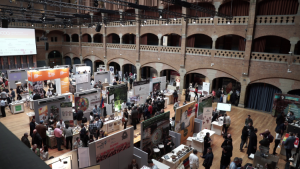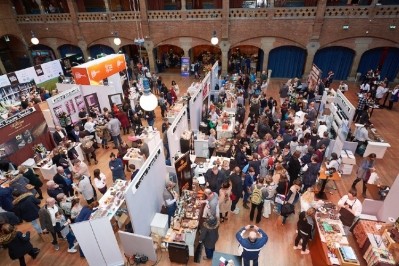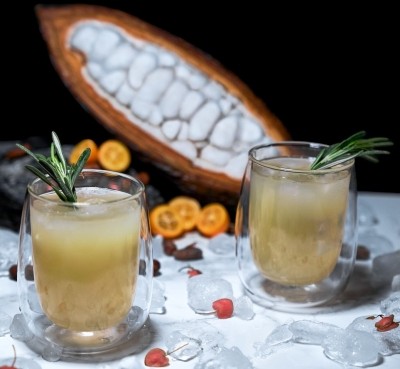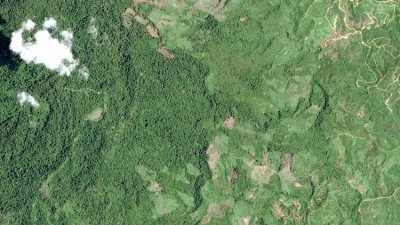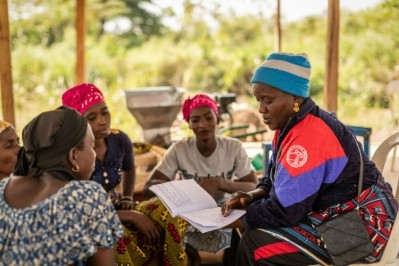Chocoa 2020
Two worlds collide: Innovation and sustainability make an impact at Chocoa 2020
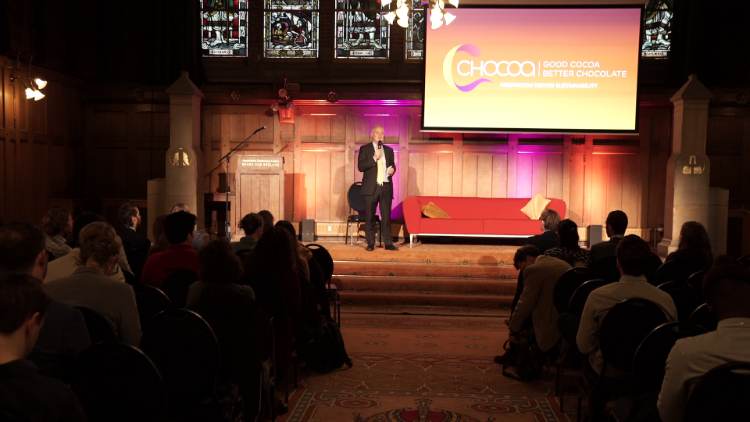
Opening the conference, co-founder Jack Steijn said sustainability has been one of the main themes of Chocoa since it began eight years ago, and it is an issue that has become more significant in the past five years.
"If you want to have a lasting impact on sustainability, you have to improve markets, you have to bring people together, from different sectors like we are doing here at Chocoa," he told participants from 42 consumer and producing countries gathered in Amsterdam’s Beurs van Berlage conference centre.
Another key area of Chocoa 2020 was exploring techniques to support farmers, and crucially how to make cocoa farming attractive for a new generation.
Business farming
The time is now for digital innovation,” said Alloysius Attah, CEO and co-founder of Farmerline, a company set up in Ghana, aimed at transforming smallholder farmers into successful entrepreneurs.“Farmerline is all about creating lasting wealth for cocoa farmers and creating jobs for young people in the industry.”
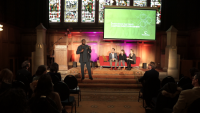
He told the conference new technology is making a lot of impact in Ghana and thousands of young farmers are using smartphones to access information on how to learn to farm as a business.
“Everything we deliver is powered by technology,” he said: “Mapping, education, finance, traceability and farmer ID, for example. There is a lot of opportunity in West Africa, but we have to create jobs for young people living in these communities and there is an incentive to make sure our programmes have a business and sustainability angle because there is wealth to be captured and created for the farmers involved.”
Digital story telling
The binary nature of the certification system (organic, Fairtrade, Non-GMO, etc) presents a fairly low ceiling for meeting consumers’ demand for information, said James Le Compte from Orijins, a digital platform developed in Ecuador that connects consumers to the source of their food via a simple QR code.
He explained in a blog on the Orijins' website, 'You’re walking down the aisle at a supermarket, and you come upon a vast choice of chocolate bars. Some of these chocolate bars have an Orijin QR code printed on the label. You take out your phone and scan the QR code. All of the relevant information is immediately displayed on your phone in a visually-alluring format, which can be easily scrolled with a flick of the finger. You see pictures of the place where the cacao was harvested, you meet the people who cultivated the cacao, you can even see the prices they were paid and how it was fermented and processed.'
“They can scan on their smartphone to discover the whole story behind their chocolate bar with more detail and data provided by a certification label," he also told the conference.
Compte is also CEO of To’ak chocolate brand and said it relies on storytelling to illustrate “the incredible steps cacao passes through before it makes it into the consumer's hands”.
He said consumers are increasingly willing to pay more for brands that are radically transparent.
“Orijin is a tool that also adds value to the farmers by telling their story, helping in productivity and quality control ... part of the app is built to work at field level to help farmers with their productivity. The platform also offers analytics for brands, takes elements of data captured at field level and post-harvest stages and visualises it in a beautiful story for the consumer.”
Online credit
Richard Kooge from CARE Nederland, a charity established after the second World War to help people living in the poorest parts of the world, explained to the conference how the Chomoka app is helping low-income women in rural areas achieve financial independence.
One of its most important features demonstrates to banks that women are reliable, dependable, and credit-worthy. With credit scores, group members are able to qualify for the benefits that financial institutions offer, including access to loans.
Kooge also highlighted the programme ‘100 weeks’, where women receive €8 cash a day, which adds up to €800 to use for basic needs.
Rainforest Alliance
The Rainforest Alliance has been at the forefront of sustainable innovation for many years, mapping forests through audits on the ground and using satellite technology to monitor deforestation.
Karen Reijnen addressed the conference by saying technology is just a tool; noting that what is really important to make an impact is collaboration and discussion; and giving an example of its work with the World Cocoa Foundation’s Cocoa Action programme, which collects data from farms and co-operatives in one digital dashboard, to improve, for example, pruning methods on farms to increase productivity and preserve the forest.
“Technology has allowed us to do things today, that were simply not possible five years ago,” she said.
Climate conditions
The conference also heard from Lars Saquero Moller from Danish company Ingemann, who has developed a R&D program called BioClimata in Nicaragua that analyses climate, soil quality, crops and good agricultural practices, and also provides early warning systems for weather conditions.
Financial support
Thang Truong, founder of Vietnam Cacao Brothers, has adapted an open and transparent supply chain for his company using recyclable packaging, but said that more support is required from non-profit organisations to invest in certification standards, education and traceability.
New products
When it comes to looking at new product innovation in the chocolate sector, then look no further than Swiss-based cocoa supplier Barry Callebaut, which, in the last three years alone, has launched four successful innovations in the market: Ruby chocolate, Wholefruit chocolate, a plant-based M_lk chocolate and a revolutionary 3D chocolate printing technology called Mona Lisa 3D.
Bas Smit, global vice president marketing at Barry Callebaut Group, started the session on sustainable innovation by talking about Wholefruit, describing it as a “healthy indulgenc,” aimed at the consumers of tomorrow (millennials and centennials) and their perception of health and wellbeing, which is: ‘Good for me and good for the world around me’.
Smit said Wholefruit is unique because it is made from 100% pure cacaofruit and naturally contains 40% less sugar. It’s a new category, the next generation of food and drink, not only for chocolate but also can be used in smoothies and ice cream, for example.
“Barry Callebaut doesn’t own Wholefruit chocolate,” Smit said, “it’s initiated by Barry Callebaut for everybody to use. For years, we, as an industry, have thrown away most of the cacaofruit and have only been interested in the beans,” he told the conference.
He described Wholefruit as having the same potential as Tesla, bringing new, clean, energy and vision to an outdated sector, in its case, the automotive industry.
He told delegates to look at German car manufacturer Daimler, which has been hurt by expensive recalls linked to its diesel engines and has announced it is axing 15,000 jobs as it makes a costly switch to electric vehicles.
“They were fined billions of Euros - and are now 10 years behind Tesla because they didn’t invest in the fuel for the future,” said Smit. Speaking about the confectionery world, he said: “Wholefruit chocolate is that new standard because it contains 100% pure cacaofruit. It's a catgeory for the future.”
A new era
The era of buying products and putting them into our bodies, simply on blind faith, has come to an end, Chocoa 2020 was told. According to Orijin, producers, brands and retailers that ignore this trend will most likely pay for it by losing market share and/or being rendered obsolete - just like certain car manufactures.
